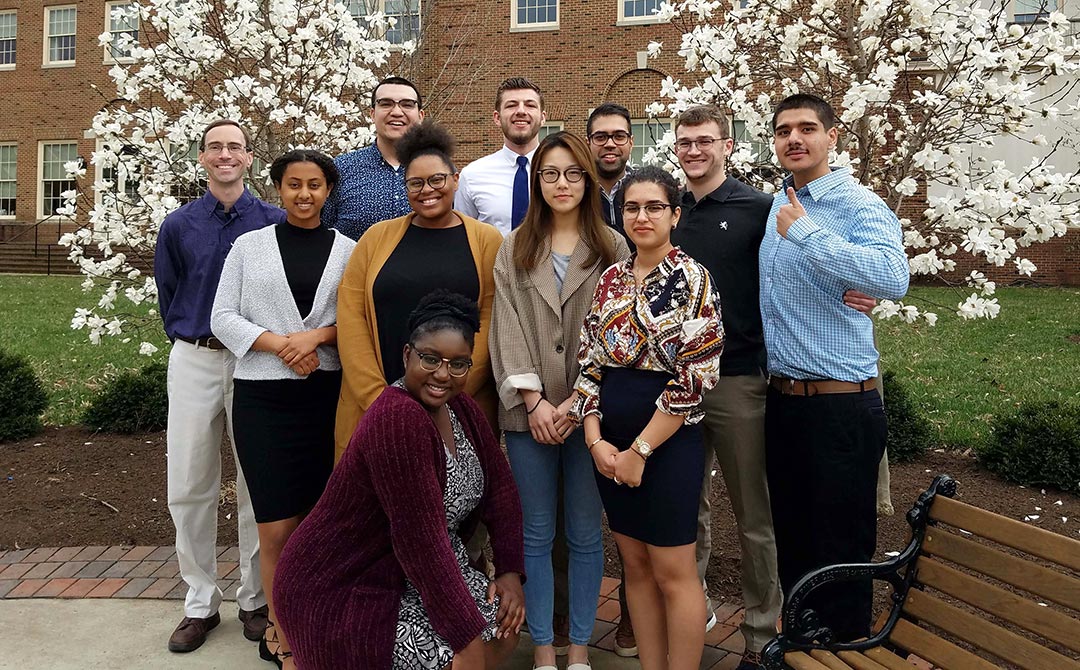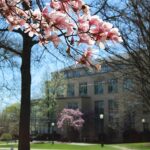
Wooster Team Advances to Finals at DataFest 2019

WOOSTER, Ohio – A team of five Wooster students advanced to the final round of this year’s DataFest competition at Miami University, impressing an array of academic and industry judges with their research, analytical, and presentation skills. A second Wooster team narrowly missed making the cut-off.
DataFest is a program of the American Statistical Association that takes place at sites across the country in April and early May, in which “teams of undergraduates work around the clock to find and share meaning in a large, rich, and complex data set.” This was just the second year that Wooster participated, and the two squads—the Tartan Team and the Black and Gold Team—went up against three dozen other teams from four schools: Xavier University, Bowling Green State University, Northern Kentucky University, and host Miami. Seven of Wooster’s 10 competitors were sophomores, one was a junior, and two were seniors. Only one, senior Mierkamil Mijiti, competed last year.
In addition to their relative youth, the Wooster teams were notable for the diversity of their backgrounds and academic interests. That was intentional, according to Drew Pasteur, associate professor of mathematics and computer science, who accompanied the students to the competition. Each team had a mix of statistical, computer science, economics, and social science background and knowledge, and “it was clear that they got each other thinking through the course of the weekend.”
Paige Clay, a sophomore political science and Africana studies double major, and member of the team that advanced to the finals, agreed. “We were all different in our thinking and approach, which made us stronger,” she said. “It was nice working with people outside my discipline, seeing how they think.”
The basic structure of DataFest is straightforward. On Friday afternoon, the teams are presented with a large, complex set of data, some information about the organization providing it, and a fiendishly open-ended challenge: do something useful with it. By Sunday morning, they need to be ready to present their results to a panel of judges, including representatives from the client organization. The competitions are still going on around the country, so neither the organization nor the nature of the data can be revealed.
“You could have done an entire I.S., or even a Ph.D. dissertation, on this data set,” Pasteur said. “To make something of it in less that 48 hours is a real tall task.”
Alayt Isaak, a math major and studio art minor, said her team began by bouncing ideas off one another about how to extract useful insights from the data. “Once you have an idea of where you want to go, you can think about what mathematical modelling techniques can be used to get there. You think you have a lot of time, but you don’t. You need to know when to stop with one part and get on to the next.”
Clay agreed. “With such a large data set, there are so many angles you can take. We spent five or six hours just on that part.’
The members of the Tartan Team were:
- Rita Chiboub ’21, a global and international studies major from Fes, Morocco
- Angela Danso Gyane ’21, a history and political science major from Woodbridge, Va.
- Alayt Issak ’21, a mathematics major and studio art minor from Addis Ababa, Ethiopia
- Mierkamil Mijiti ’19, a computer science and mathematics major from Urimqi, China
- Brett Stern ’21, a mathematics and business economics major from Livonia, Mich.
The members of the Black and Gold Team were:
- Tianyi Cai ’20, a mathematics major from Shanghai, China
- Raghu Choudhary ’19, an economics major from Kolkata, India
- Paige Clay ’21, a political science and Africana studies major from Denver, Colo.
- Shivam KC ’21, a mathematics major and computer science minor from Kathmandu, Nepal
- Angelo Williams ’21, a mathematics and computer science major from Ellwood, Penn.
“Our teams really shone in their creativity, their presentation skills, and their ability to frame and contextualize the problem,” Pasteur said. “Exactly the things you would expect liberal arts students to do well.”
Posted in News on April 25, 2019.
Related Posts
Related Areas of Study
Political Science
The study of power, with concentrations in U.S. politics, international relations, political theory and comparative politics.
Major MinorMathematics
Numbers + patterns + structures multiplied by a zest for analysis and inquiry
Major MinorHistory
Critically examine events and societies of the past and learn to tell the stories future generations need to know
Major MinorGlobal & International Studies
Economics, history, and political science courses with a global and international perspective
MajorEconomics
Learn how humans organize to sustain life and enhance its quality from a diversity of economic perspectives
Major Minor

